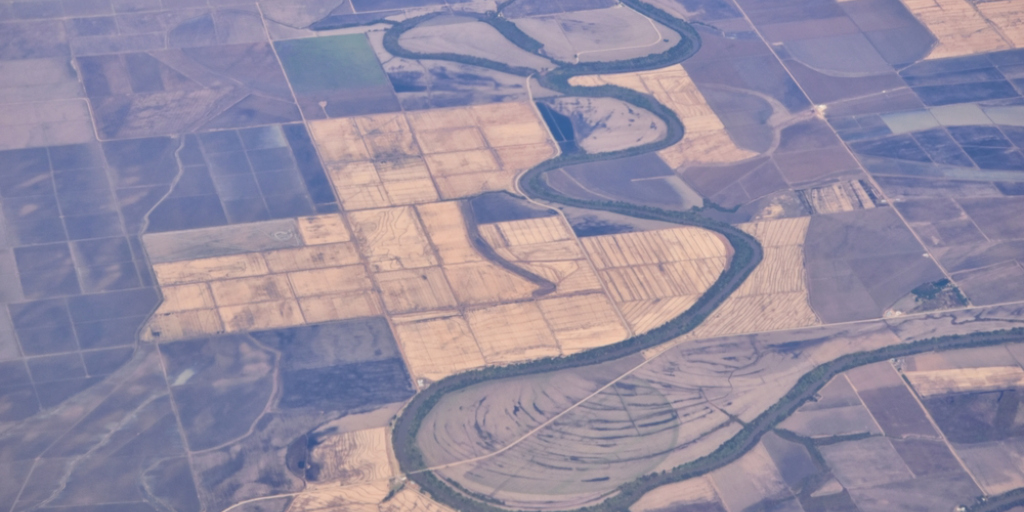Wind through
Today I’m going to tell you about the phrasal verb “wind through.” When we use this phrasal verb, the subject, the thing doing the action, is always a path or a route. You never say—never say—that a person winds through, never say a car winds though, never say an animal winds through. Instead, you say a hiking trail winds through, a road winds through, or, as I said today, a river winds through .
You need two ingredients to use “wind through.” First, you need something that takes a twisting and curving form. A road can take a twisting and curving form, if there are lots of small turns. The second ingredient is, you need the surroundings or you need the environment.
In the sentence, “The road winds through the dense forest,” we have both ingredients. The road is the thing that takes a twisting and curving form. And the dense forest is the surroundings, the environment in which it happens. So we put those two ingredients together and we say, “The road winds through the dense forest.”
If you look at a map of the United States and you zoom way out, you might think the Mississippi River goes straight down the middle of the country. But zoom way in and look at it, especially in the southern part of the river. It doesn’t go in a straight line from Memphis, Tennessee, to the Gulf of Mexico. It twists and it turns and it curves and it bends.
The photo that is on the transcript of this expression—to see it, go to PlainEnglish.com/569, then click on “Wind through”—the photo is a great aerial shot of the Mississippi River winding through the farmland of the southern United States.
In the southern third especially, the river winds through a few different environments. It winds through the dense, hardwood forest. That means, as the river twists and turns, the environment around it is hardwood forest. Farther south, the Mississippi River winds through the marshland. The marshland is very wet, soft, and muddy, with lots of vegetation. Then, the environment changes yet again. And the river winds through sandy lowlands. And down here, the land and the water are constantly changing. The islands are soft and ever-shifting. Zoom way in on Google Maps, right where the Mississippi River meets the Gulf of Mexico. The land and the water merge into one.
So in that example, the river winds through the forest; then it winds through the marshland; then it winds through the sandy lowlands. It goes in a twisting and curving pattern through all these environments. And notice: the river winds through. Not a person, not a boat, not a fish, not a turtle: the river winds through.
When they first laid the railroad tracks, connecting the east and west of North America, the railroads wanted to take the most direct path. Through most of the center of the continent, the flat part, train tracks are pretty straight. But when you get to the mountains, the train tracks wind through the mountains. Because of the geography, it was not always possible to build train tracks in a straight line.
So the result is that train tracks wind through mountain passes. The tracks are the path. The path has twists and turns and curves. And the environment is the mountains. So the train tracks wind through the mountains.
Have you ever driven on a road that has hairpin turns? That’s a way to get down a steep mountain, you go left to right, do a sharp turn, go right to left, sharp turn, and do it again, all the way down the hill. The first time I saw that was in Italy; Tuscany, it was. I was a kid and we were on a class trip. The road winds through the hills of Tuscany.
If you go on a hike, you might take a hiking path that winds through the forest, if that path takes a twisting and turning route.
JR’s song of the week
Today’s song of the week is “When the Saints Go Marching In” by Louis Armstrong. Louis Armstrong is a jazz musician from New Orleans, and he took New Orleans style music and popularized it around the world. He’s probably New Orleans’s most famous resident. And they even named the airport after him.
JR picked “What a Wonderful World” by Louis Armstrong for Lesson 179, the very first time we did a song of the week, so we need to pick a different one today. And today’s is “When the Saints Go Marching In.” This was a religious hymn that dates back to the 1800s, but Louis Armstrong recorded it in 1938 and it’s one of his most famous songs. It refers to the desire to go to heaven. “When the Saints Go Marching In” by Louis Armstrong is the song of the week today.
See you next time!
That’s all for today’s Plain English. Thanks so much for making Plain English a part of your English learning routine. Remember to check us out on Instagram, follow the account, like the content, leave comments—it will help Plain English reach more people. We are @plainenglishpod on Instagram .
We’ll be back next Monday—see you then!
Learn more expressions like this



